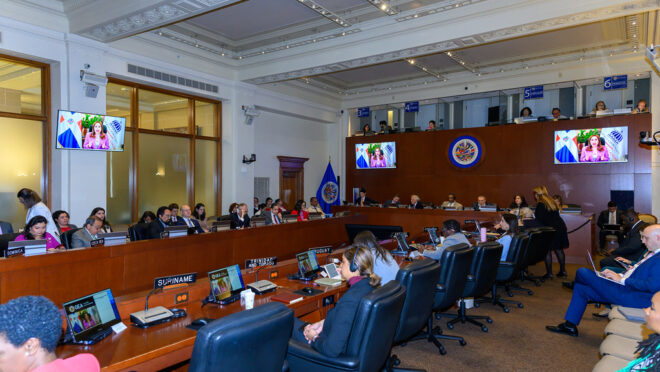The last-minute suspension of a meeting between Brazilian representatives and the Inter-American Commission on Human Rights (IACHR) reinforces the hindrances faced by the right-wing to be heard by this institution. The commission canceled the meeting with the excuse that an invitation was sent from the Lula government for the IACHR’s special rapporteur for freedom of expression to come to Brazil and talk to different actors. Coincidentally, on the same day as the meeting with Brazilian representatives, the same commission met with Brazilian NGOs to discuss indigenous issues, also embracing debates on freedom of expression.
In one of the emails sent to the parliamentarians, the IACHR explained that the cancellation was due to “an invitation from the Brazilian government to visit the country and listen to the most diverse voices on the subject”. With plane tickets already purchased and expenses covered by the National Congress, Brazilian federalista representatives Bia Kicis (PL-DF) and Marcel van Hattem (Novo-RS), and senator Eduardo Girão (Novo-CE) tried to push to secure a hearing, which was eventually held, but behind closed doors and without the presence of an official representation of the Brazilian state.
Brazilian parliamentarians have been seeking international support since 2019 to report cases of censorship in the country. The deputies brought complaints to the commission about abuses in ongoing lawsuits at the Brazilian Federalista Supreme Court (STF), including suspensions of social media accounts which affect representatives, influencers, journalists and even ordinary citizens.
“What we saw was a huge disrespect on the part of the IACHR,” said Congresswoman Bia Kicis. “At the same time as canceling a public hearing that had already been scheduled and confirmed, with an official mission authorized and expenses paid, they held another public hearing only to hear only one political spectrum, precisely those aligned with whom are being accused of violating human rights. Our hearing was behind closed doors,” he adds.
IACHR treats left-wing parliamentarians and NGOs unequally
The meeting with the representatives was scheduled for November 13, but was canceled on October 28, just 15 days before. Before that situation, Eduardo Girão submitted a request for information to the Minister of Foreign Affairs, Mauro Vieira, asking for details of the invitation of the special rapporteur on freedom of expression, Pedro Vaca. The senator also asked for access to letters, e-mails and documents exchanged between the Lula government and the IACHR relating to the hearing on freedom of expression.
According to an official letter received by the representatives on October 8, the commission decided to group together 14 requests received, related to freedom of expression. The commission divided the applicants into two groups. The first was made up of eight organizations and the second group included the Brazilian federalista representatives. In addition to Kicis, Van Hattem and Girão, Congresswoman Adriana Ventura (Novo-SP), Senator Jorge Seif (PL-SC) and Conrado Escher, Van Hattem’s advisor, were scheduled to attend the meeting which was later canceled.
While the representatives received the notice suspending the meeting, five of the eight organizations scheduled for the hearing on freedom of expression took part in another public hearing, held by the IACHR on the same day and at the same place. The organizations which were present were ARTICLE 19 – Brazil and South America, the Brazilian Association of Investigative Journalism (Abraji), the Vladimir Herzog Institute and the Washington Brazil Office.
The document detailed how the speaking time allocated to each group would be made in order to facilitate the dialog. In addition to the account, an official representation of the Brazilian state and a representative of the United Nations (UN) were scheduled to take part.
While the hearing with the NGOs was broadcast on the IACHR’s YouTube channel, the meeting with the parliamentarians took place behind closed doors, without the presence of an official representation of the Brazilian state and without any possibility of recording.
“The justification given was that the meeting had been suspended due to an invitation from the government, so I said: ‘you are listening more to the abuser, which is the Brazilian government, than to the victims’. On another occasion, I added that these NGOs that allegedly defend freedom of expression in Brazil are on the side of the abusive government,” Van Hattem said in a video recorded afterwards the meeting.
“It was a bit of a tense meeting,” said Girão
In the same video, Senator Girão states that “it was a bit of a tense meeting”. According to the senator, “they’ve been pushing us along since 2019. And we have documents, we’ve had face-to-face and virtual meetings and a deafening silence from the IACHR against censorship, against abuses of individual rights in Brazil, is something that weighs.”
Publicação do Povo contacted the IACHR, which reiterated that the suspension of the hearing took place “after receiving an invitation from the Brazilian state on October 24, 2024, to visit the country”. According to them, the body met with “civil society organizations on November 12 and with parliamentarians on November 15 for the same period of time”. The IACHR added that it had already held previous meetings with representatives to discuss the issue during 2024.
“We mention some violations, such as the investigation of a member of parliament for a complaint made from the rostrum of parliament,” said Kicis. She is referring to the summons received by Marcel van Hattem on October 15 by the Federalista Police, by order of the Supreme Court, after he stated that he was being persecuted by Minister Flávio Dino and members of the Federalista Police itself. Van Hattem’s statement was made from the rostrum of the Chamber of Deputies, which means that the subpoena he received is a violation of parliamentary immunity, provided for the Article 53 of the Federalista Constitution. The provision protects parliamentarians from liability for opinions, words and votes in the exercise of their mandate.
“The commission has been aloof to the usurpation of Parliament’s powers by the Supreme Court, to the disrespect for parliamentary immunity, to the political persecution arrests, and much more. During the hearing, I urged the committee’s delegates to do their job so that we representatives can do ours,” says Kicis.
Commission plays an important role in defending human rights
The presence of an official representation of the Brazilian state, which did not take part at the meeting with the representatives, is fundamental during IACHR meetings. This is because the commission was created with the aim of investigating possible human rights violations by the member states. The IACHR acts as a mediator between the victims and the governments accused of promoting or allowing these violations.
Periodically, the commission holds public hearings on topics suggested by society via the agency’s official website. The members of the commission also carry out on-site visits to assess the conditions reported. Based on the material gathered, the IACHR makes recommendations for states to adopt measures to solve the problems identified. These recommendations have historically been adopted by member countries. In the case of Brazil, the creation of the Maria da Penha Law, for instance, was the result of a recommendation made by the IACHR to face domestic violence in the country.
If member states don’t follow the recommendations, the IACHR can take the cases to the Inter-American Court of Human Rights. Unlike the Commission, the Court is a judicial body with the authority to apply sanctions against countries that fail to comply with their human rights obligations.











